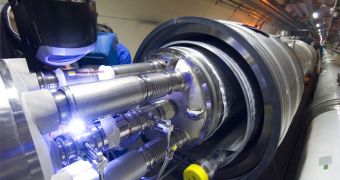The Large Hadron Collider is rapidly approaching completion and should become operational by the end of the year. It will become the biggest particle collider ever built, probably powerful enough to create even microscopic black holes. It has been suggested on a number of occasions, despite CERN's reassurance, that such a microscopic black hole would come to accrete matter and grow so big that it would eventually destroy the Earth and even the entire solar system.
As far as I can remember, there have been more than one lawsuits against CERN to stop the Large Hadron Collider from ever becoming operational, for fear that a black hole originating inside it would eat the Earth altogether.
Steve Giddings, professor of physics at the University of California, believes that such a scenario is practically impossible. The strongest argument is that microscopic black holes created inside the LHC would be able to exist for only a very small amount of time, roughly a nano-nano-nanosecond, which is too little time for it to accrete any matter at all. And even if these microscopic black holes do not evaporate in this time, the large scale effects they would produce would be basically unobservable.
In a study co-authored with Michelangelo Mangano of the European Center for Nuclear Research, Giggings found that if the LHC were able to produce microscopic black holes then so could cosmic rays coming from space, which are probably more powerful than any particle collider that will be built on Earth. Since no large scale effects or any microscopic black holes have been ever observed in the Earth's atmosphere, it is only logical to believe that they pose no danger whether or not they exist.
"The future health of our planet and the safety of its people are of paramount concern to us all. There were already very strong physics arguments that there is no risk from hypothetical micro black holes, and we've provided additional arguments ruling out risk even under very bizarre hypotheses," Giddings said.
When completed, the system will collide hadrons, composite sub-atomic particles formed of quarks, in order to study the nature of the universe, look for extra dimensions of space and new sub-atomic particles and forces yet undiscovered.

 14 DAY TRIAL //
14 DAY TRIAL //